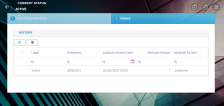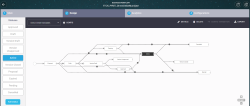Direct Debit
Once the policyholder agreed to pay the premiums by direct debit, the insurer initiates a direct debit activation procedure in order to notify the bank about the payment arrangement. After the mandate is activated by the bank, the insurer must regularly send the necessary payment instructions files, in order for the bank to respond by transferring the agreed premium amounts into insurer's accounts. When the system receives a notification about the cancellation of a mandate, it changes the status of the specified mandate from Active to Cancelled, and logs this change into the mandate history.
The Billing and Collection solution helps SEPA* and UK insurers to handle direct debit payment operations - starting with the direct debit mandate activation procedure (in order to notify the bank about the payment arrangement between insurer and insured) up to the moment the payment is collected. Find out more on the Direct Debit SEPA* and Direct Debit UK pages. Both direct debit flows are fully automated. For example, for direct debit payments that respect some rules (such as providing the correct payment details, having an active mandate, and a bank account available for charging), the process of billing and collecting is completely automated, and the insurer does not need to intervene at all. Second to that, some functionalities allow manual interaction, and you can read about those features on the Debit SEPA* and Direct Debit UK pages.
Below, an example of a mandate activated automatically, by the solution:
The solution does not allow for any direct debit mandate to be manually deleted.
To find out more details about how the solution works, check the following pages:
-
Direct Debit SEPA - for business details about the SEPA* flow.
-
Direct Debit UK - for business details about the UK flow.
-
SEPA Direct Debit - for technical details about the SEPA* flow.
-
UK Direct Debit - for technical details about the UK flow.
-
Flow Parameters And Scheduled Jobs - for details about the automated jobs handling the direct debit processing.
*Single Euro Payments Area (SEPA) allows customers to make cashless euro payments – via credit transfer and direct debit – to anywhere in the European Union.
Setting The Solution For DIDE Processing
The Billing and Collection solution can be applied for two types of direct debit processing:
-
DIDE Sepa - functionality used for the European area,
-
DIDE UK - functionality used for the UK area.
For activating your direct debit functionality, you must first choose a direct debit type - either Sepa or Uk. In order to do so, please take one of the following paths:
In Innovation Studio - Digital Experience > Digital Journeys > Processor Settings > Digital Flow Settings List > FTOS_PYMT_DIDEConfiguration > Edit Digital Flow Settings > FTOS_PYMT_DIDEProcessor > Edit Processor Settings: Insert the value for the flow you need to implement - either Sepa or Uk.
In your Portal - Main menu > Settings > Flow Settings > Digital Flow Settings List > FTOS_PYMT_DIDEConfiguration > Edit Digital Flow Settings > FTOS_PYMT_DIDEProcessor > Edit Processor Settings: Insert the value for the flow you need to implement - either Sepa or Uk.
If the option configured in the processor is Sepa, the Billing and Collection solution takes in consideration the functionality implemented for DIDE Sepa. Otherwise, if the inserted value is Uk, the solution takes into consideration the flow implemented for DIDE UK.
The following parameters must be filled in, according to your needs:
-
numberOfDaysInAdvance: numeric value expected, -
runningOnBankHolidays: boolean value expected, -
excludeWeekDays: [text value expected, ... ].
More about these parameters, on the Flow Parameters And Scheduled Jobs page.
This step is only applicable when you are configuring the direct debit functionality for UK.
The following are the available processors:
This processor sets the value for the DIDEUK_Instructions job that collects all the Draft mandates and sends instructions for their activation to BACS.
The following parameters must be filled in, according to your needs:
-
destinationSort: numeric value expected, -
destinationAcct: numeric value expected, -
destinationType: 0, -
usersName: text value expected
This processor sets the value for the FTOS_PYMT_DIDEInstructionFile job that, for the active mandates registered in the system, assembles the file containing the direct debit payment instructions that are delivered to BACS, and then to the payer's bank.
The following parameters must be filled in, according to your needs:
-
destinationSort: numeric value expected, -
destinationAcct: numeric value expected, -
destinationType: 0, -
transaction: string value expected, -
freeFormat: numeric value expected, -
amount: numeric value expected, -
usersName: text value expected.
For more details about the jobs and parameters, check the Flow Parameters And Scheduled Jobs page.
The direct debit functionalities can be applied to policies that have the payment type set to Direct Debit, and their business status is in InForce or Suspended. The solution is going to process all the invoices that are in Generated business status - with their due date less or equal to the current date, added to the value set in the numberOfDaysInAdvance parameter.
Direct Debit Business Workflow
FTOS_PYMT_DirectDebitMandate is the master business workflow that handles the different types of changes affecting a direct debit mandate during its lifetime - like transitioning the mandate through different versions and business states (from Draft to Expired). All the updates are logged in the mandate history tab, for further analytical use.
Below, an example of the FTOS_PYMT_DirectDebitMandate business workflow - as it is displayed on Innovation Studio:
The following are the behaviors - characteristic to any mandate, managed by this business workflow:
-
Every mandate (or mandate version) starts in Draft status and must go through an approval process before reaching the Active status. Approval is automatic, based on bank response.
-
Once a mandate is in Active status, its settings can no longer be modified.
-
If you want to manually update an Active mandate, you must create a new mandate version. After editing, you must manually approve the new mandate version; use the status picker to pick the Approved status.
-
When you create a new mandate version, the current version is retired.
-
Only one version of a mandate can be live at one time.
-
Only one draft version can be active at one time. If the case, you must close the current draft version and then, open another one.
-
Mandates in Cancelled status cannot be edited (versioned) - by you or the system.
-
No mandate can be deleted manually from the system.
-
The system also can automatically adjust a mandate, based on mandate data received. All adjustments are automatically integrated into a new version of the mandate, and logged into the mandate history.
A direct debit mandate stage can take one of the following values:
-
N (new),
-
D (deleted, cancelled), or
-
M (modified).
These stages are registered by the solution, following the processing of payment files/ payment data. For example, if a request for payment through an active mandate is denied (a number of times, which you can configure), this is picked out and sorted by the system, and the mandate is transitioned to the Deleted stage. The system also automatically logs this update on the relevant mandate record (this is done by creating an actualized version of the mandate).
| Status name | Description |
|---|---|
| Proposal | Initial state for any mandate registered in the system. |
| Draft | Initial state for any mandate registered in the system. |
| Pending | Ongoing state - the mandate is pending approval from the bank. |
| Active | Ongoing state. |
| Version Draft | When the selected mandate becomes editable. |
| Version Unapproved | When a draft version of a mandate is canceled. |
| Approved | Ongoing state. |
| Version Closed | When a draft version of a mandate is closed. |
| Expired | Final state. The mandate is expired. The mandate cannot be moved from this state to any other states. |
| Cancelled | Final state. The mandate is cancelled. The mandate cannot be edited or moved from this state to any other states. |
| Transition | Description |
|---|---|
| _Proposal | Initial state. |
| Active_Cancelled | When the system registers a notification about the mandate cancellation. |
| Active_Expired | When the mandate reaches its end day. The expiration triggers the automatic change of the payment type on the policy, from Direct Debit to Bank Transfer (OP). |
| Active_VersionClosed | When a version of the mandate is closed. Used for mandate versioning. |
| Approved_Active | When the mandate reaches its start day. |
| Approved_Draft | When a change of the policy payment type from Bank Transfer (OP) into Direct Debit is performed on a policy. |
| Approved_Expired | When the number of days for the activation of a mandate were exhausted. |
| Cancelled_Active | When a mandate is reactivated. This status is only visible/ available for DIDE UK processing. |
| Draft_Active | When the mandate reaches its start day. This transition is triggered automatically by a specific job that verifies if the current date is the mandate begin date and changes the status to Active for all eligible mandates. |
| Draft_Cancelled | When the system registers a notification about the mandate cancellation. |
| Draft_Expired | When the number of days for the activation of a mandate were exhausted. The expiration triggers the automatic change of the payment type on the policy, from Direct Debit to Bank Transfer (OP). |
| Draft_Pending | After the instruction file for the mandate's activation is generated, and the mandate is pending approval from the bank. |
| Draft_VersionDraft | When the mandate versioning process starts. |
| Pending_Active | When the mandate reaches its start day. |
| Pending_Cancelled | When the system registers a notification (e.g. AUDDIS file) about canceling the mandate, or a user manually cancels the mandate. |
| Proposal_Active | When the mandate reaches its start day. |
| Proposal_Draft | When the mandate is registered in the system but it is not activated yet, or its begin date is yet to come. |
| Proposal_Expired | When the number of days for the activation of a draft mandate were exhausted. |
| VersionDraft_Approved | When a version of the mandate is approved. Used for mandate versioning. |
| VersionDraft_VersionUnapproved | When the opened version is not approved. Used for mandate versioning. |

